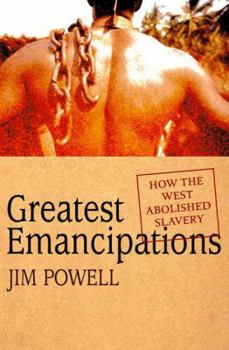Greatest Emancipations: How the West Abolished Slavery
For thousands of years, slavery went unchallenged in principle. Then in a single century, slavery was abolished and more than seven million slaves were freed. "Greatest Emancipation" tells this... This description may be from another edition of this product.
Format:Hardcover
Language:English
ISBN:0230605923
ISBN13:9780230605923
Release Date:June 2008
Publisher:Palgrave MacMillan
Length:284 Pages
Weight:0.30 lbs.
Dimensions:1.0" x 6.6" x 9.5"
Customer Reviews
1 rating
Abolishion of Slavery - Same Horror, Different Solutions
Published by Thriftbooks.com User , 15 years ago
In the introduction to his book, Greatest Emancipations, Jim Powell first covers a general historical look at civilizations and worldwide slavery and slave trades. He asserts that it seems as though every civilization had slavery, including ancient Africa, Mesopotamia, Egypt, China, India, the Americas, the Jews, and the Greek and Roman empires. Powell opens his book by posing the question "Could Slavery Be Abolished?" Using this point of view, he focuses on slavery in the Western world and how an abolition movement began, and eventually swelled to larger and more potent national antislavery movements. Powell uses a biographical style, moving from country to country, introducing key individuals in each movement, their personal biographies, organizations, successes and failures in the movement toward abolition of slavery. Powell's book is very detailed and his end notes and bibliography are outstanding. He also included an impressive time line of the antislavery movement in the Western World. However, I did find at times he prolonged the blow-by-blow action well beyond what was necessary to make his point. Though he seemed to record all of the participants in the slave trade, he only brushed by the participation of black African's in their brutal capture, imprisonment, torture, and sale of their own countrymen. Powell seems to shy away from the fact that there is more than enough guilt to go around here. Powell is an impressive historian and an excellent writer. Though this book is very detailed, it is likewise very readable. I am convinced every reader will learn a number of facts they knew nothing about by reading Greatest Emancipations. However, I did find a weak point in Powell's presentation. As he moved from section to section, and chapter to chapter, he would often jump backward or forward in time to cover abolitionist's activities in another part of a country, or while moving to a different country altogether. I usually had to stop and go back to a previous section or chapter to get my historical bearings again before proceeding on in the new chapter. Though this proved annoying, it may have been the only way Powell could have effectively cover the material. Powell ends the book by primarily covering the aftermath of the U.S. Civil War, post-war reconstruction of the South (or the lack of reconstruction efforts by President Andrew Johnson) and the final abolition of slavery in the United States. He goes to the extreme to characterize President Lincoln's decision to chose a military solution to prevent the South's secession from the Union, and end slavery at the same time, as a terribly flawed decision. Once I reached the final section of the book, Powell's conclusion, I realized why. In his conclusion, Powell thinks the nation would have been better served if Lincoln had chosen to forgo a civil war and chose instead to just let the South "peacefully" secede from the Union. He feels that by doing so, and applying pressure through a






